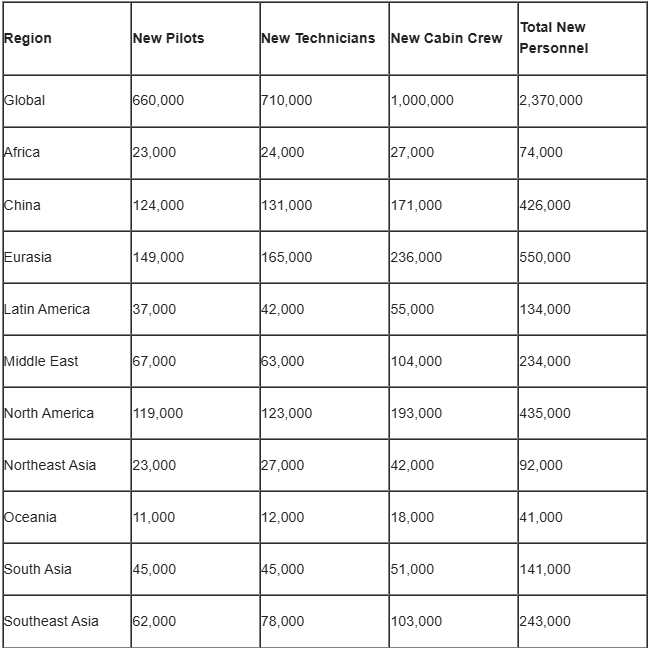 Fueled by emerging markets and changes in fleet mix, Boeing projects continued demand for aviation personnel as the global commercial fleet changes to meet the demands of the flying public.
Fueled by emerging markets and changes in fleet mix, Boeing projects continued demand for aviation personnel as the global commercial fleet changes to meet the demands of the flying public.
Boeing’s 2025 Pilot and Technician Outlook (PTO) anticipates the industry will require nearly 2.4 million new aviation professionals through 2044 to meet the long-term increase in air travel.
Boeing, which released its annual 20-year forecast at EAA AirVenture Oshkosh, said commercial carriers will need substantial hiring and training to sustain the global commercial fleet, including:
- 660,000 pilots
- 710,000 maintenance technicians
- 1,000,000 cabin crew members
“As commercial air traffic demand continues to outpace economic growth and the global fleet expands to meet demand, our industry will keep the fleet flying safely and efficiently by supporting workforce development for carriers worldwide,” said Chris Broom, vice president, Commercial Training Solutions, Boeing Global Services.
“The industry is investing in technologies, including mixed reality— an immersive blend of physical and digital environments that enhances hands-on learning and situational awareness. Boeing is supporting customers with digitally advanced aviation training products and services to meet their needs. The bedrock of our approach remains competency-based training and assessment methodology to ensure high quality aviation training.”
In the PTO, Boeing projects through 2044:
- Two-thirds of new personnel will address replacement due to attrition, while one- third supports growth in the commercial fleet
- Demand for new personnel is driven primarily by single-aisle airplanes
- As in past years, Eurasia, China and North America continue to drive demand for more than half of new industry personnel
- South Asia and Southeast Asia are the fastest-growing regions for personnel with staffing demand expected to more than triple
The PTO includes these projections for industry needs through 2044:
A leading global aerospace company and top U.S. exporter, Boeing develops, manufactures and services commercial airplanes, defense products and space systems for customers in more than 150 countries. Our U.S. and global workforce and supplier base drive innovation, economic opportunity, sustainability and community impact. Boeing is committed to fostering a culture based on our core values of safety, quality and integrity.
Caution Concerning Forward-Looking Statements
This document contains “forward-looking statements” within the meaning of the Private Securities Litigation Reform Act of 1995. Words such as “may,” “will,” “should,” “expects,” “intends,” “projects,” “plans,” “believes,” “estimates,” “targets,” “anticipates,” and other similar words or expressions, or the negative thereof, generally can be used to help identify these forward-looking statements. Examples of forward-looking statements include statements relating to future demand for commercial airplanes and aviation personnel, as well as any other statement that does not directly relate to any historical or current fact.
Forward-looking statements are based on expectations and assumptions that we believe to be reasonable when made, but that may not prove to be accurate. These statements are not guarantees and are subject to risks, uncertainties, and changes in circumstances that are difficult to predict. Many factors, including economic conditions in the United States and globally, general industry conditions as they may impact us or our customers, and other important factors disclosed previously and from time to time in our filings with the U.S. Securities and Exchange Commission, could cause actual results to differ materially and adversely from these forward-looking statements. Any forward-looking statement speaks only as of the date on which it is made, and we assume no obligation to update or revise any forward-looking statement, whether as a result of new information, future events or otherwise, except as required by law.
Featured image credited to Mary Kirby











